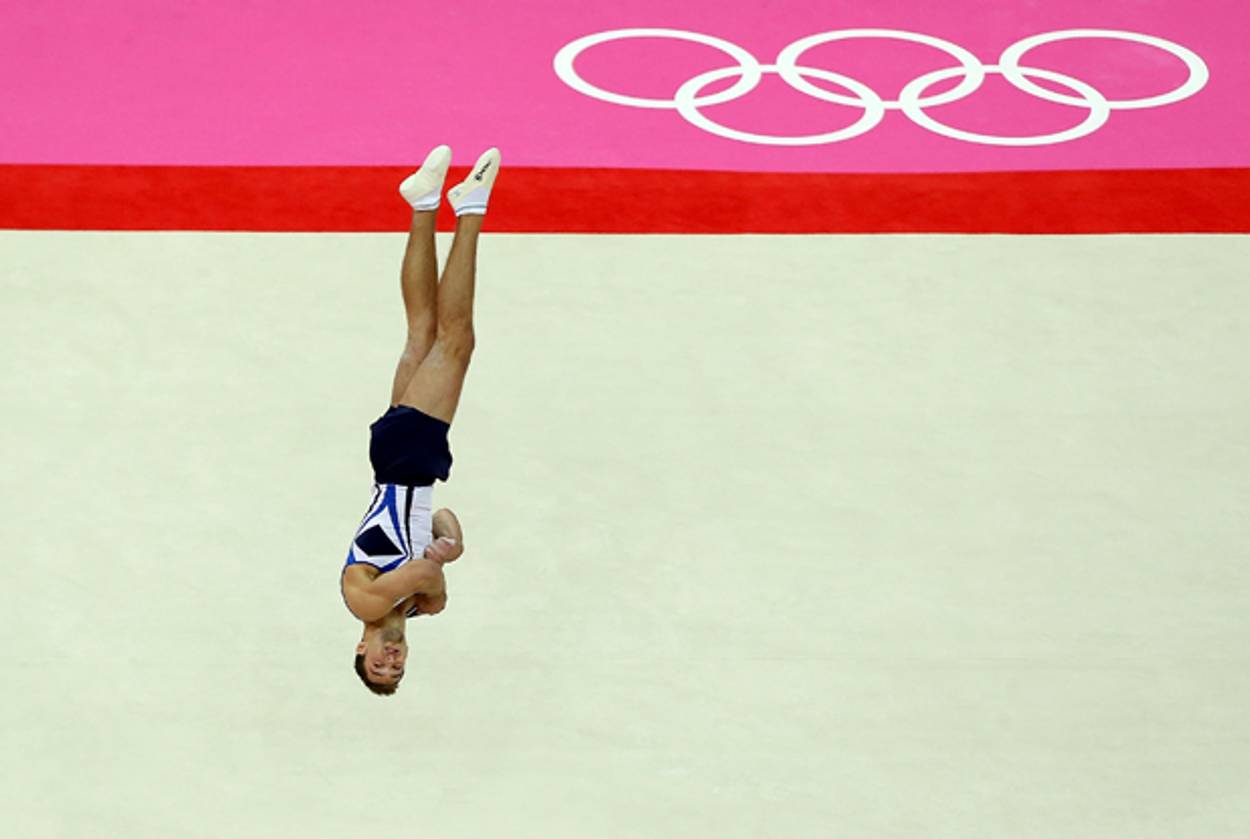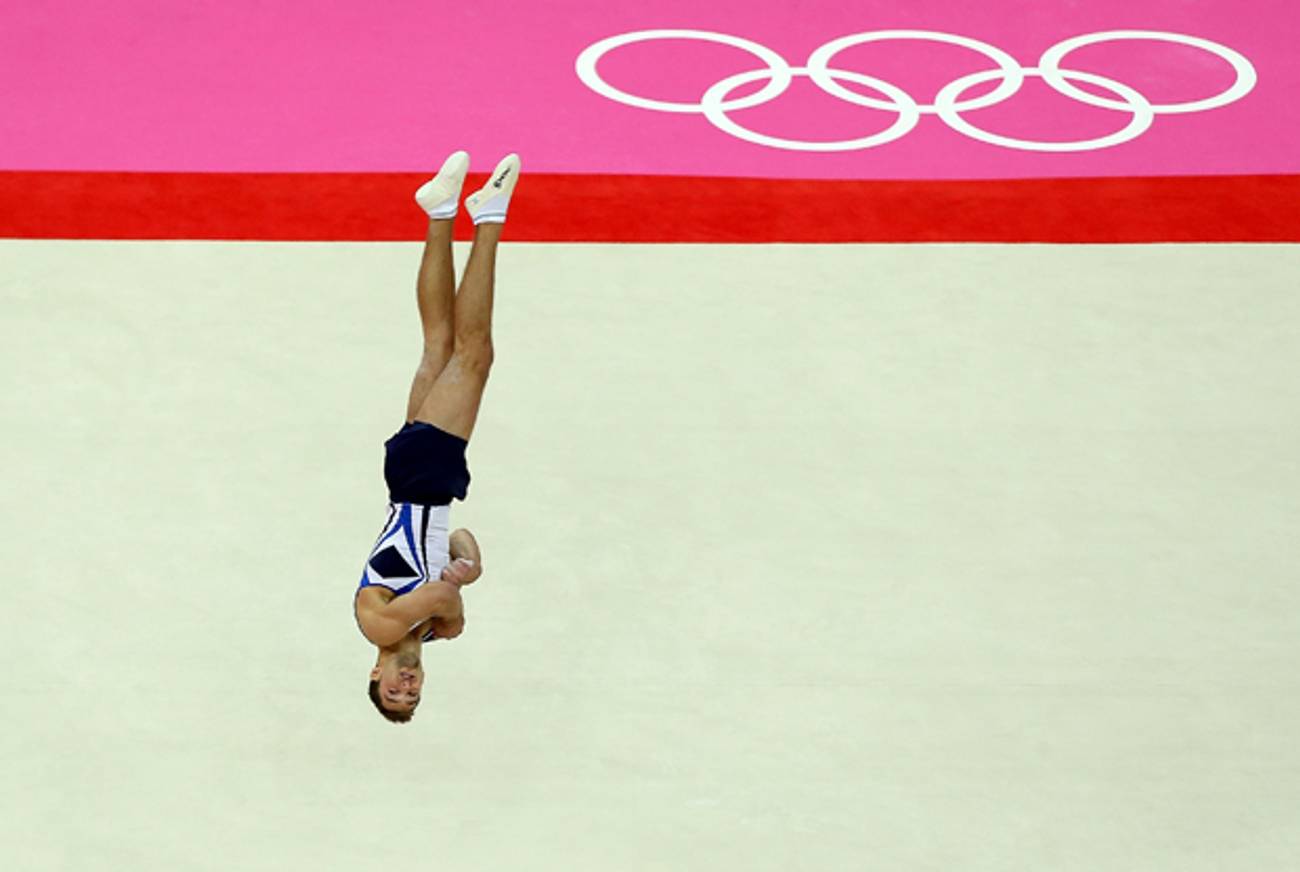Israel’s Olympic Shame
Leaving London’s games without a single medal, Israel needs to get serious about its commitment to sports




Have you heard of Guy Matzkin? He could have been a contender. The young Israeli fell in love with archery when he was a teenager after seeing it featured on a reality television show. Like any champion, he devoted hours each day to rigorous training. He didn’t mind that the field where he shot his arrows was muddy, or that it was only 18 meters long, 52 meters shorter than the Olympic standard. He didn’t mind that, unable to afford new targets, he had to recycle his old ones until they fell apart, or that he had to pay out of pocket to fly to international competitions, dragging his father along as his caddy. This May, using the small sum each Israeli soldier receives when he or she completes their mandatory military service, Matzkin flew to the European championship in Amsterdam, faced some of the continent’s best archers, and beat them all. He returned home to Israel, thrilled with the prospect of an upcoming trip to the London Olympics.
It never happened. Israel, he soon learned, had unrealistically exacting criteria to determine which archers merited a spot on the national team. Matzkin didn’t meet them. Nor did any other archer in Europe, Israeli or otherwise. Matzkin appealed and was denied. Rather than face the same people he’d already bested in Holland for a shot at Olympic gold, he stayed home.
Those Israeli athletes who were fortunate enough to earn the opportunity to compete in London didn’t do much better. This week, Israel’s Olympic journey ended with a whimper when the national team concluded its appearance in the London games without a single medal—the first time this has happened since the 1988 games in Seoul. Limor Livnat, the minister of culture and sport, announced her intention to form an official committee to investigate the debacle. And the Israeli press, for the most part, treated the 30th Olympiad as a series of unfortunate events that robbed Israel’s talented athletes of deserved glory. But Israel’s poor performance is not the result of poor fortune. Underfunded and mismanaged, Israeli sport is a rundown disaster—a far cry from the sleek image the start-up nation likes to imagine it sees when it examines itself in the mirror.
It’s a complicated story. In part, it’s about numbers. Israel’s state budget for 2011 was $61 billion. Its investment in sport for the same year was approximately $21 million, or 0.03 percent of the budget, one of the lowest rates in the Western world. Even after agreeing to reduce its national spending to 122 billion euros this year, for example, Spain is still investing around 150 million euros in sport, or, relatively speaking, three times as much as Israel does. Spain has Rafael Nadal, a handful of gold medals, and every soccer championship imaginable to show for it. And Britain, after a disappointing performance in the 1996 Atlanta games—one gold medal, 15 in total—increased its investment from 60 million pounds to 264 million pounds; as of this writing, they are fourth in the overall tally of medals in London, with 22 gold, 13 silver, and 13 bronze. But government support is not the singular criterion for Olympic success. Team USA, the games’ most illustrious and decorated presence, receives no continuous federal funding and relies mostly on contributions and corporate sponsorships.
With major tech companies increasing their presence in Israel, it’s not hard to imagine the Jewish state emulating the American model and teaming up with corporate benefactors, giving us a Google-sponsored fencing team, maybe, or the Intel weightlifters’ squad. Still, even if corporate money started flowing in, the question of management would remain unresolved. The USA’s effort is well-run; Israel’s is not. Of the meager sports budget, a considerable portion goes to the Wingate Institute, a top-notch sports education and training facility in central Israel; schools take up another chunk, and they use the money mainly to form their own youth leagues separate from the national sporting system. But nearly a third of all money invested in sports, the largest single slice of the pie, goes to local authorities who invest it as they see fit. Almost always, the budget ends up in the hands of elected officials who have no expertise in the field: Rather than building a system dedicated to spotting talent and training promising athletes, which is what sports professionals do, the hundreds of mayors who receive a sliver of the sports budget almost always spend it on building new facilities, which is what mayors do. To understand the full impact of this faulty system, imagine that the mayor of Towson, Md., was the one responsible for advancing the career of young resident and prodigious swimmer Michael Phelps but, not knowing anything about swimming, spent his meager sports budget on building a shiny new basketball court instead.
All this leaves around 10 percent for the various sporting associations, the professional bodies that are entrusted with regulating their given fields’ development and growth. The largest of these associations, the ones governing soccer and basketball—Israel’s two most popular sports—feel no pain; they receive generous funding from the state-run sports betting lottery, which they use mainly to build new and better stadiums. And, being popular, they enjoy external sources of income, from corporate sponsorships to audience attendance. Archery, rowing, and other, more obscure sports depend solely on the kindness of government strangers. And the government is not always kind: In 2005, yet another committee was formed to investigate why Israel is so far behind in sports, the second such committee convened within the decade, and it found that the best way to promote sports was to discriminate between the various fields and pay more attention to those that could actually yield international achievements. With no professional infrastructure, however, and with no budgets to develop a cadre of knowledgeable professionals, the decision about which field is worthy of investment falls to politically appointed committees with little or no expertise. The committee that denied Matzkin his ticket to London, for example, was headed by the former head of Israel’s Olympic committee; the other two members, however, were a former runner who now heads a bridge association and a former senior officer in the IDF.
Life is not much better for those deemed worthy: For the most part, successful athletes become state-sponsored employees and are richly rewarded regardless of their achievements. Starvation is no way to raise a champion, but neither is gluttony—none of these handsomely rewarded athletes achieved anything of merit, let alone a medal, in London. The few who did win medals in previous Olympic games—Israel has a total of seven—are not the rule but the exception.
If history is any guide, Livnat’s newly appointed investigatory committee is likely to find precisely what its predecessors had already discovered, namely that what Israeli sports so direly need is more money and more power in the hands of professionals who know what to do with it. Neither is easy to come by. Any real effort at reform will undoubtedly meet, as previous efforts had, with the claim that there’s not a shekel to spare; but just this week, the government approved a budget of NIS 8.3 million to transport a few mobile homes from Migron to a nearby settlement. This means that the 50 families that reside in Migron will receive nearly as much money from the state as Israel invests in all its professional sports associations combined.
Most of the world has already realized that sports are more than just a pleasant pastime; they’re an indication of a civic society’s health. According to a report by the global consulting firm Substance, investing in sports tends to empower underprivileged youth, bring about a reduction in crime, and contribute to overall economic growth. It’s sad that 65 other nations have ridden these insights all the way to the Olympic podium while the start-up nation did not. And thank God for the one athlete who did stand up as a winner in London, honoring the Israeli athletes slain in the Munich Olympics, and unleashing a torrent of Jewish pride: the gymnast Aly Raisman, born and trained in the USA.
***
Like this article? Sign up for our Daily Digest to get Tablet Magazine’s new content in your inbox each morning.
Liel Leibovitz is a senior writer for Tablet Magazine and a host of the Unorthodox podcast.
Liel Leibovitz is editor-at-large for Tablet Magazine and a host of its weekly culture podcast Unorthodox and daily Talmud podcast Take One. He is the editor of Zionism: The Tablet Guide.